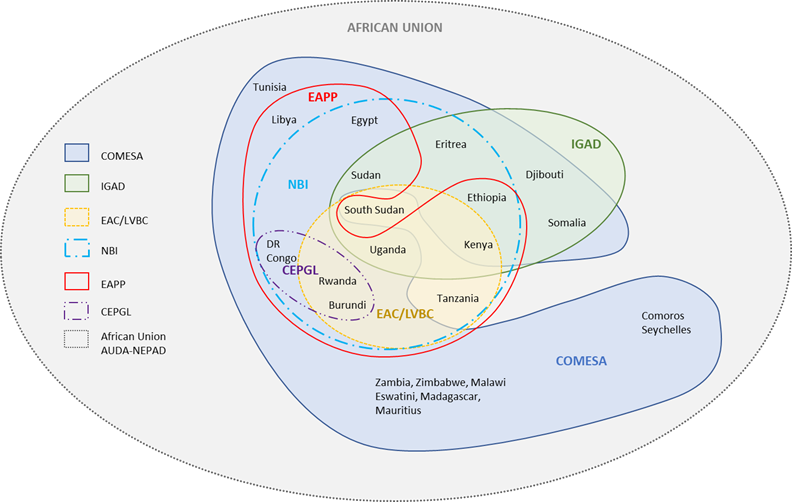
Most NBI Member States tend to retain a strongly national character when developing their water policies, rather than a coordinated regional outlook. It is important, therefore, to strengthen the transboundary dimension of national water policies in order to avoid fragmented and management decisions, as well as the problem of under-developed national policy frameworks for planned water resources management and development activities.
NBI’s approach to develop a shared orientations and guiding principles for water resources management and development has been laid down in the Nile Basin Sustainability Framework. The basic idea is to serve as a guide to the NBI on matters of sustainable development of the shared water resources in the basin until a permanent legal framework (Nile River Basin Cooperative Framework Agreement (CFA)) comes into force. It comprises policies, strategies and guidance documents and is not legally binding for countries but rather governs activities and projects implemented under the NBI itself.
The Strategy for Strengthening Transboundary Aspects of National Water Policy in the Nile Basin seeks to strengthen provisions for transboundary cooperation and coordination in national water policy frameworks to guide the sustainable development for the member states’ common benefit from the Nile Basin water resources.
Coming soon...
The NBI Policy-Portal is a web-based platform and repository that brings together all the different policies, strategies, and guidelines of the Nile Basin Sustainability Framework (NBSF) under a single user interface allowing for their easy access for use by the NBI ...
Policy Portal
The NBI Policy-Portal is a web-based platform and repository that brings together all the different policies, strategies, and guidelines of the Nile Basin Sustainability Framework (NBSF) under a single user interface allowing for their easy access for use by the NBI Centres, Nile riparian countries, and members of the general public.
The NBSF was initially developed in 2011 as a suite of policies, guidelines, and policies which guide the efforts of the Member States towards the attainment of sustainable development and management of the common Nile water resources. This collection of policies, strategies, and guidelines, which is referred to as the Nile Basin Sustainability Framework (NBSF), guides NBI’s work, ensuring it is based on international best practices and supports the attainment of NBI’s shared vision.
Recognising that effective inter-State cooperation over shared transboundary water resources is critically important, the international community has adopted Sustainable Development Goal 6.5, calling upon States to implement ‘integrated water resources management’ (I...
SDG Reporting
Recognising that effective inter-State cooperation over shared transboundary water resources is critically important, the international community has adopted Sustainable Development Goal 6.5, calling upon States to implement ‘integrated water resources management’ (IWRM) at all levels by 2030 including, where appropriate, through transboundary water cooperation. Two indicators have been developed under SGD Target 6.5, including SDG Indicator 6.5.2, which measures the proportion of a transboundary basin area covered by an operational arrangement for water cooperation. NBI has developed a report on the status of transboundary water cooperation in the Nile Basin to assist countries in reporting against SDG 6.5.2.
NBI has, in close collaboration with member countries, mapped out existing cross-border cooperation arrangements as well as experiences of national level organizational arrangements for transboundary water management in the Nile Basin. Such exercises seek to share ex...
Mapping current cooperation arrangements
NBI has, in close collaboration with member countries, mapped out existing cross-border cooperation arrangements as well as experiences of national level organizational arrangements for transboundary water management in the Nile Basin. Such exercises seek to share experiences and best practice examples between countries, as well as add to that state of knowledge on cooperation modalities in the region.
This course is intended to acquaint participants with the broader NBI Policy Framework and with the outputs from the project on Strengthening the Policy Frameworks for Transboundary Water Resources Management in the Nile Basin (2022). This involved an in-depth review...
E-Learning course
This course is intended to acquaint participants with the broader NBI Policy Framework and with the outputs from the project on Strengthening the Policy Frameworks for Transboundary Water Resources Management in the Nile Basin (2022). This involved an in-depth review and learning process regarding the currently existing arrangements for transboundary water cooperation in national policies and related institutional frameworks.

